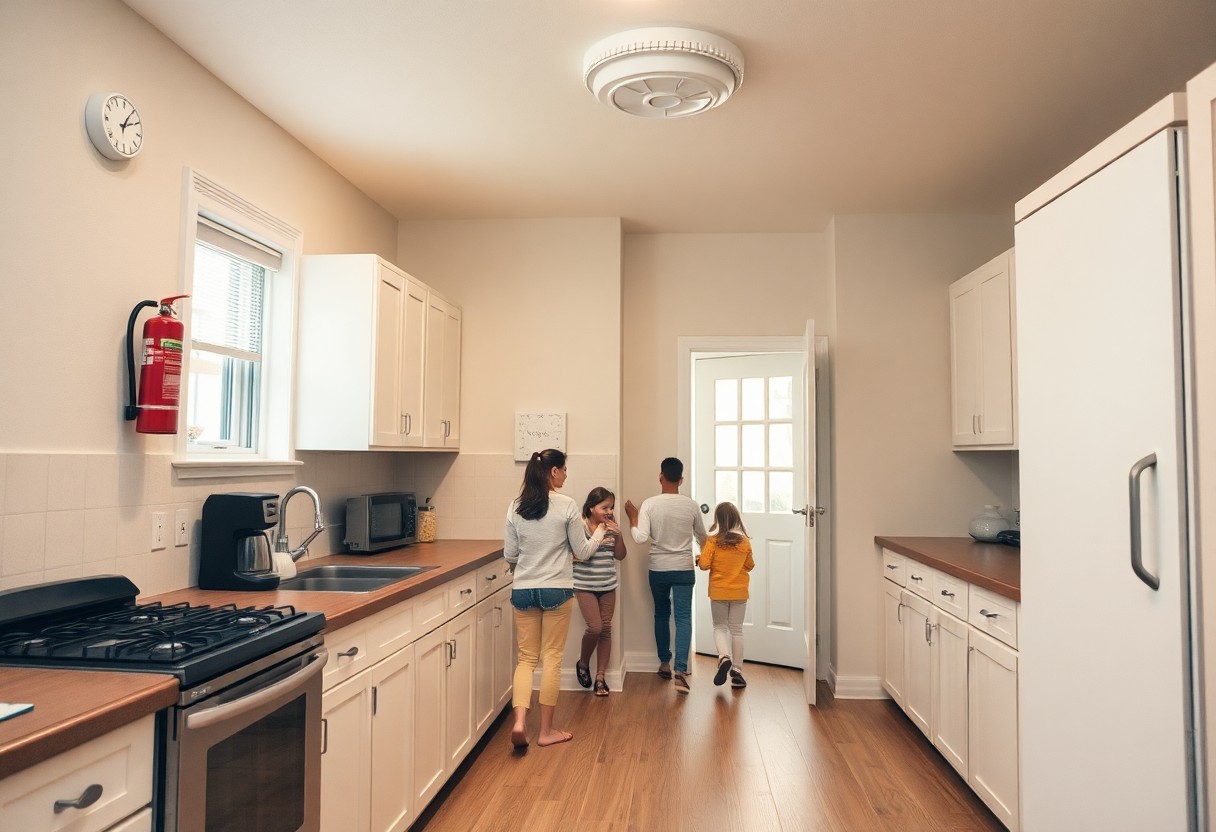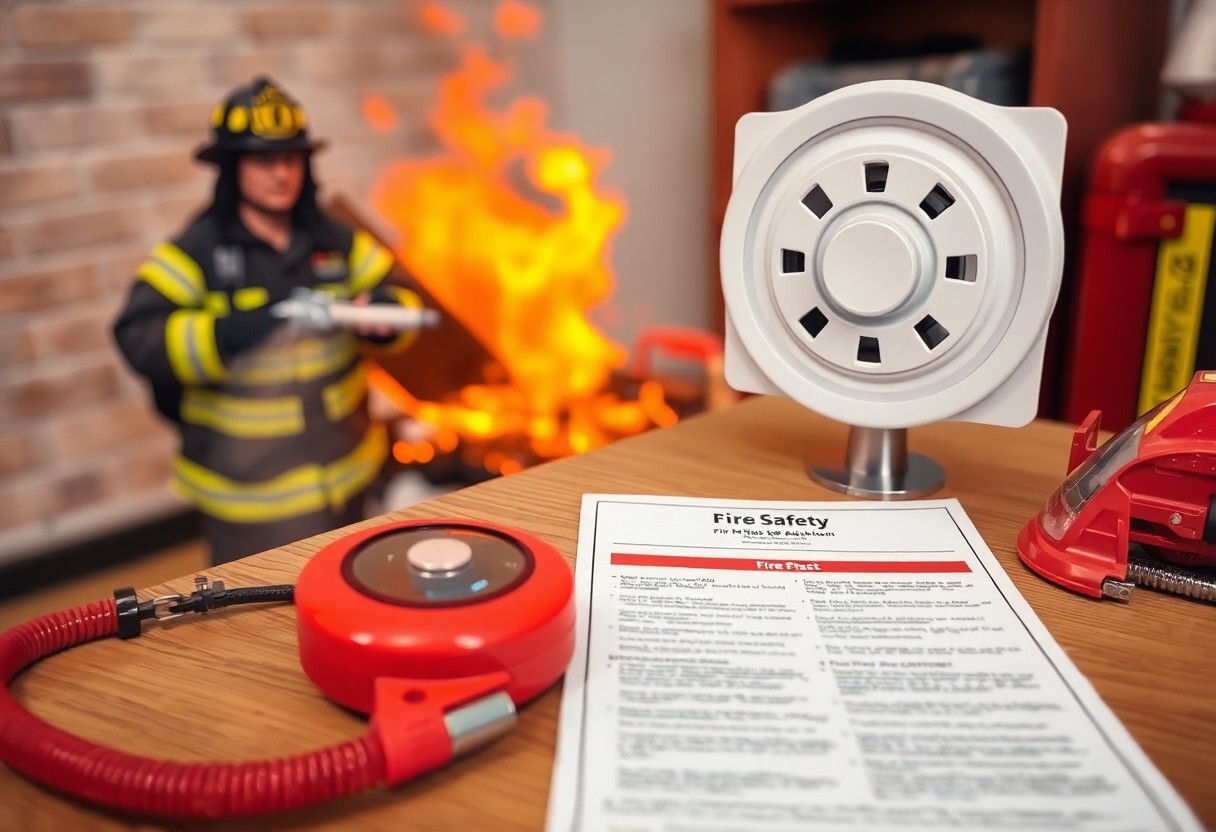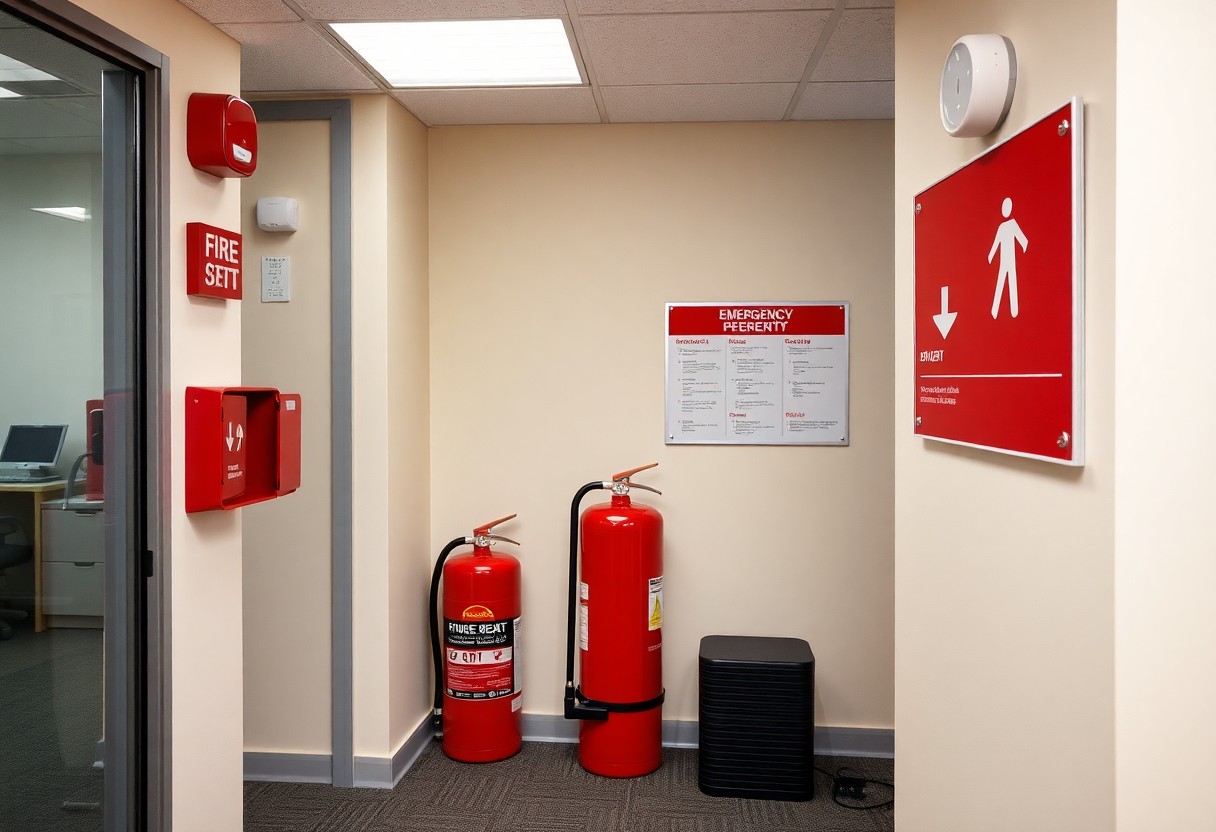Just as you prioritize the comfort and functionality of your home, it’s vital to safeguard it against fire hazards. Fire safety is not just a checklist; it’s a critical aspect of protecting your loved ones and property. This list of imperative tips will equip you with the knowledge you need to prevent fires and respond effectively in case of an emergency. Your awareness and preparedness can make all the difference when it comes to fire safety in your home.
Install Smoke Alarms
For effective fire safety, installing smoke alarms throughout your home is crucial. These devices can detect smoke early, providing you and your family with invaluable time to evacuate and call for help. Be sure to place alarms inside every bedroom, outside sleeping areas, and on each level of your home, including the basement. Regular maintenance and testing of these alarms can significantly enhance their reliability.
Test Monthly
Clearly, testing your smoke alarms each month is a vital step in ensuring they function correctly. Simply press the test button on the device to confirm that the alarm sounds. This quick check can save lives by ensuring your smoke alarms are always ready to alert you in case of a fire.
Replace Batteries Yearly
The importance of replacing smoke alarm batteries at least once a year cannot be overstated. Fresh batteries ensure that your alarms will function when you need them most, preventing any unfortunate surprises during an emergency.
Alarms should ideally have a date written on the side indicating when the last battery replacement occurred. By setting a specific date, such as the start of daylight saving time, you can create a routine that helps keep your devices in top working condition. Additionally, some alarms now come with sealed lithium batteries designed to last up to ten years. If your model has this feature, it may still require replacement in accordance with the manufacturer’s guidelines after a decade of service.
Keep Fire Extinguishers
The presence of fire extinguishers in your home is vital for effective fire safety. These devices can help you tackle small fires before they escalate. It’s necessary to choose the correct types for various potential fire sources like grease, electrical, or flammable liquids. Ensure that your family knows how to use them properly, and make it a point to keep them easily accessible in key areas like the kitchen and garage.
Know Locations
Now that you have fire extinguishers, it’s important to know where they are located. Ensure you place them in strategic areas, such as the kitchen, garage, and near any fire-prone zones. Inform all household members about these locations to enhance your fire safety preparedness.
Check Regularly
Some fire extinguishers require regular checks to ensure they are in working condition. A monthly inspection can go a long way in maintaining their reliability. Look for any visible signs of damage, ensure the pressure gauge is in the safe zone, and check that the nozzle is clear of obstructions.
Plus, it’s advisable to schedule a professional inspection annually. During this check-up, a trained technician can refill, replace, or service your extinguisher, ensuring it will function properly in an emergency. Keeping detailed records of these checks can help you stay organized and proactive about your fire safety measures.
Create an escape plan
Some safety strategies are important for every homeowner, and creating an escape plan is one of the most important. This plan should outline multiple exit routes from each room in your home, ensuring that all family members are aware of how to escape quickly in case of a fire. Be sure to identify safe spots outside your home where everyone can gather once they’ve escaped. Regularly review and update this plan as needed, particularly if there are changes in your home or family dynamics.
Practice regularly
There’s no substitute for practice when it comes to fire escape plans. Conduct regular drills with your household to ensure everyone understands the escape routes and actions to take in the event of a fire. This will build confidence and help eliminate panic during a real emergency.
Designate meeting spot
For effective communication and safety, designate a specific meeting spot outside your home where everyone will gather after escaping from a fire. This should be a location that is easily accessible and safe from any potential hazards, like a neighbor’s yard or a nearby tree. By knowing where to meet, you can quickly account for all family members and avoid any confusion during a stressful situation.
A designated meeting spot is not just about convenience; it’s a fundamental part of your fire safety plan. It provides clarity in a chaotic moment, ensuring everyone knows where to go. Choose a location that is far enough away from your home to keep your family safe from flames and smoke, yet close enough to be easily reached. Make sure that all family members, including children, are familiar with the spot and can easily identify it during an emergency.
Avoid Flammable Materials
Despite the commonality of everyday items in your home, many can pose a fire hazard if not managed properly. It’s imperative to keep flammable materials such as paper products, textiles, and chemicals away from heat sources and open flames. This simple precaution can significantly reduce the risk of a fire igniting in your home, ensuring a safer living environment for you and your family.
Keep Away from Heat
From candles to cooking appliances, maintaining a safe distance between heat sources and flammable materials is vital. Always position items like paper, fabric, and plastics at least three feet away from heaters, stoves, and any open flames. This practice minimizes the risk of combustion and helps keep your home fire-safe.
Store Safely
With proper storage techniques, you can significantly lower the chances of an accidental fire. Ensure that all flammable materials, such as cleaning supplies and gardening chemicals, are stored in cool, dry places away from heat sources. This includes keeping your garage organized and free from clutter where flammable items may unintentionally come into contact with ignition sources.
Store flammable liquids in their original containers with tight-sealing lids and label them clearly. It’s best to keep these items in a clearly designated area away from living spaces to avoid accidents. By implementing proper storage practices, you not only reduce fire risks but also contribute to a safer household environment.
Use Candles Cautiously
Now, while candles can create a warm and inviting atmosphere in your home, they also pose a significant fire risk if not used cautiously. Always place them away from flammable materials, and ensure they are on stable surfaces where they won’t be easily knocked over. Regularly check your candles to ensure they are burning safely and be mindful of the space around them.
Never Leave Unattended
Even a moment’s distraction can lead to a dangerous fire hazard. Always extinguish candles when you leave a room or go to sleep. It only takes a small spark to ignite surrounding items and cause a major fire. Your safety and that of your loved ones should always come first, so make it a habit to keep an eye on all lit candles.
Use Sturdy Holders
Never place candles in flimsy or unstable holders that can tip over easily. Using sturdy holders designed specifically for candles helps to contain melted wax and prevents the flame from spilling onto surfaces, reducing the risk of accidental fires. Make sure the holders are made of heat-resistant materials, and regularly inspect them for damages to ensure their effectiveness.
The right candle holders not only enhance the aesthetic of your space but also serve an important safety function. Opt for holders that are wide enough to catch any wax drips and have a solid base to avoid tipping. Look for materials like glass or metal that can withstand high temperatures. Investing in quality holders means you are taking a proactive approach to fire safety in your home.
Monitor Electrical Outlets
All homeowners must actively monitor their electrical outlets to prevent fire hazards. Regularly check for signs of wear and tear, and ensure that all devices plugged into outlets are compatible with their capacity. If you notice any unusual smells, discoloration, or sparking, address the issue immediately to ensure your home remains safe from electrical fires.
Avoid Overloading Circuits
The practice of overloading circuits can significantly elevate the risk of an electrical fire. Be mindful of how many devices you plug into a single outlet or power strip, as exceeding the recommended capacity can lead to short circuits and overheating.
Inspect for Damage
One of the key aspects of fire safety is regularly inspecting your electrical outlets for any signs of damage. Look for frayed wires, loose connections, and discoloration of the outlet itself. Such issues can create fire risks and may indicate more serious problems within your electrical system.
Overloading your outlets can lead to severe consequences, including electrical fires. Ensure that you distribute your electrical load wisely across multiple outlets rather than relying on a single source. If you’re unsure about the capacity of your electrical system, consult with a professional electrician to evaluate your setup and suggest appropriate solutions for your home. Staying vigilant about these safety measures can significantly reduce the risk of electrical fires in your household.
Cook Attentively
After preparing a meal, you may become engrossed in other tasks, but maintaining focus while cooking is vital. Unattended cooking can lead to disastrous situations, such as kitchen fires. It’s necessary to stay alert and keep an eye on your food to prevent flames from igniting and spreading.
Stay in Kitchen
On the rare occasion that you decide to step away, make sure to turn off the stovetop or oven to prevent overheating and possible fires. Even a momentary distraction can lead to overheating, so it’s best to keep your cooking area in sight and stay engaged.
Keep Flammable Items Away
With various materials around your kitchen, ensuring that flammable items are stored safely is important for preventing fires. Items like oven mitts, paper towels, and dishcloths should be kept away from heat sources to minimize the risk.
A vigilant approach to your cooking space can make all the difference. Position flammable items a safe distance from the stove and oven. This includes removing any loose sleeves, decorative items, or packaging materials that could catch fire. Additionally, use heat-resistant materials for your cooking tools and ensure that your cooking space remains organized to help prevent any accidents from occurring while you prepare your meals.
Manage Yard Debris
Unlike indoor spaces, your yard can accumulate combustible materials that pose a fire risk. Keeping your yard clear of debris not only enhances curb appeal but also minimizes the potential for wildfires or accidental fires to spread. By regularly managing your outdoor environment, you contribute to a safer living space for your family.
Clear Leaves Regularly
Clear leaves from your yard regularly to prevent the buildup of dry materials that can easily ignite. Accumulated leaves and organic debris around your home serve as fuel for fires, especially during dry seasons. Take the time to rake, bag, or compost these leaves frequently to maintain a safe environment.
Maintain Landscaping
Manage your landscaping thoughtfully by trimming overgrown plants and clearing any dead or dying vegetation. Regular maintenance can prevent your yard from becoming a fire hazard, especially during dry spells when plants are more susceptible to igniting.
With proper landscaping, you can create natural fire breaks and reduce the amount of combustible material near your home. Consider using fire-resistant plants and creating a defensible space by keeping plantings well spaced apart. This practice not only enhances the aesthetics of your property but also plays a significant role in fire prevention, keeping your home safer in case of an emergency.
Know Local Fire Laws
Many homeowners overlook the importance of understanding local fire laws, which are important in ensuring your safety and compliance. Each region has specific regulations that pertain to fire safety, including building codes, fire permits, and safety inspections. Familiarizing yourself with these laws can not only protect your property but also help prevent fines or legal issues down the line. Always check with your local fire department or municipality to stay updated and informed about any changes that may affect your home.
Burn Restrictions
Assuming you have outdoor spaces, it is vital to be aware of any burn restrictions in your area. These regulations can vary based on weather conditions, local ordinances, and air quality concerns. Knowing when and where you can safely conduct controlled burns or use fire pits will help you avoid potential hazards and legal repercussions. Always consult with local authorities before lighting any outdoor fires, and ensure you have the necessary permits if required.
Fireworks Regulations
You need to understand the laws regarding fireworks in your community, as these regulations can differ significantly from one area to another. Some regions have strict limitations on the use and sale of fireworks, while others may allow certain types or sequences only during specific times of the year. Different states may also have age restrictions and permitting processes for firework displays, so be sure to verify the guidelines. Ignoring these laws can lead to safety risks and legal penalties.
A thorough understanding of your local fireworks regulations can prevent unfortunate accidents and fines. Always check with your city or county’s official guidelines before purchasing or using fireworks, particularly around holiday seasons when they may be more prominent. It’s also wise to consider the safety measures you should take while operating fireworks, including keeping a safe distance from flammable materials and having a water source nearby in case of emergencies. When in doubt, consider attending public displays overseen by professionals to enjoy the festivities without the associated risks.
To wrap up
On the whole, implementing these 10 imperative fire safety tips can significantly enhance your home’s protection against fire hazards. By ensuring you have functioning smoke alarms, creating an escape plan, and being vigilant with flammable materials, you are taking proactive steps to safeguard your loved ones and property. Regular maintenance of fire extinguishers and practicing safety measures will empower you to act decisively in an emergency. Prioritizing fire safety is not just about compliance; it’s about fostering a secure environment for you and your family.


